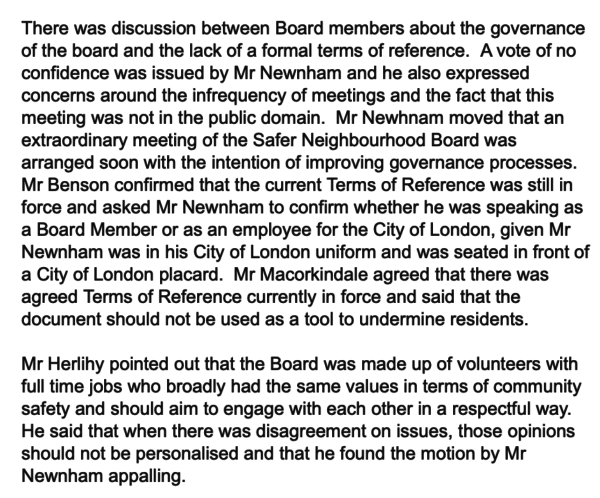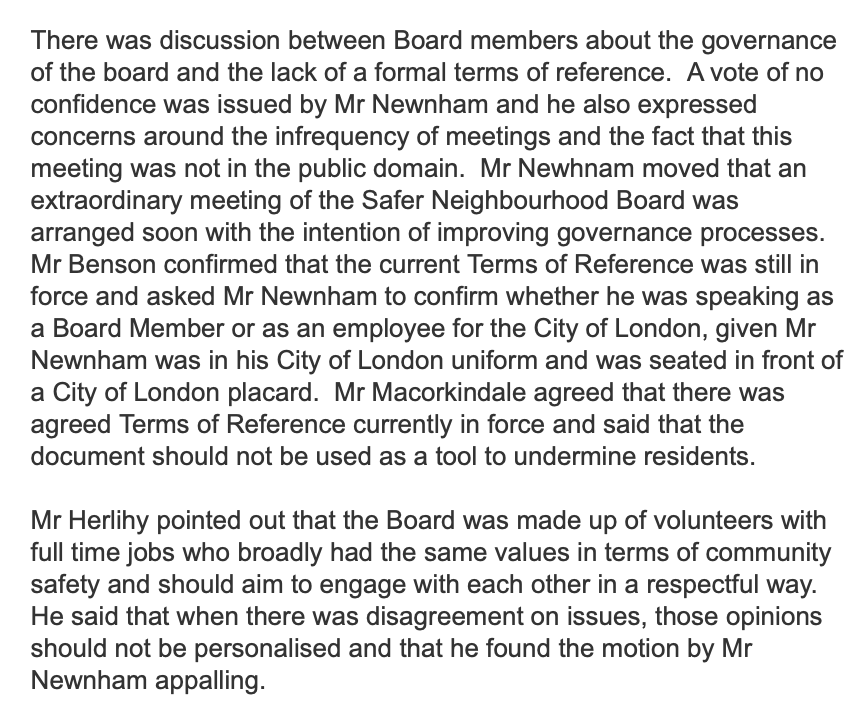Crime and policing latest: the Waltham Forest Safer Neighbourhood Board hits the skids again, and now LBWF – controversially – wants to disband it
The Waltham Forest Safer Neighbourhood Board (WFSNB) brings together councillors and residents, and is a potentially very important component of the local fight against crime, supported, as it is, by LBWF, the Metropolitan Police Service, and the Mayor’s Office for Policing And Crime (MOPAC), and charged with ‘bringing police and communities together to decide local policing and crime priorities, solve problems collaboratively and make sure that the public are involved in a wide range of other community safety decisions’.
However, five years ago, when this blog last looked at the WFSNB, what emerged was shocking (see links below).
WFSNB meetings were few and far between, attendances poor, and minutes incomplete. It was unclear who the constituent members were, and several of those publicly listed as such vigorously denied that they had ever agreed to serve. The almost comedically self-important chair and vice-chair presided over a body that was quick to bicker over internal affairs, but slow to carry out its core functions.
Worst of all, in the ongoing turmoil, the WFSNB sometimes had struggled to account for the money which MOPAC gave it to run local projects, with monitoring reports either submitted incomplete, and after the agreed deadlines, or missing altogether. Indeed, the situation had degenerated to the extent that MOPAC was threatening an embargo on all future funding.
After these failings were exposed on this blog, and fearing negative publicity, MOPAC promised to rectify matters. Head of Engagement Natasha Plummer elaborated:
‘MOPAC has been in contact with those partners who attend and support the SNB, including the local authority and police Borough Commander, and discussions are taking place to explore what each partner can do to support SNB members in delivering all of the board’s functions, and to do so in a more clear and transparent fashion’.
The upshot came in July 2018, when what LBWF described as ‘a new’ WFSNB was constituted and launched.
Subsequently, the WFSNB largely disappeared from view. Nevertheless, close scrutiny reveals that the imprint of the past remained tangible. Surprisingly, given their uninspiring stewardship when in office, both the previous chair and vice-chair retained membership. Furthermore, antipathies of various kinds plainly continued to simmer. An exchange recorded in the published minutes of November 2020, which involved lay member Martin Newnham, LBWF Head of Community Safety Alastair Macorkindale, MOPAC’s Chris Benson, and ex-Board chair Philip Herlihy, well illustrates the prevailing tone:
Meanwhile, some women members complained of feeling bullied and demeaned. Indeed, it appeared to them that the unpleasantness at WFSNB meetings was actually getting worse.
Finally, in early 2021, LBWF appears to have concluded that the situation had become untenable, and so presented the WFSNB with a paper (apparently authored by Mr. Macorkindale) aimed at precipitating change.
The analysis of the current situation was brutal.
The WFSNB had ‘undoubtedly done good work’, it was contended, but also ‘encountered a succession of critical episodes’.
Moreover, ‘The scope of the work, the multiple skillsets required to fulfil it, and the time commitments required of the executive’ had ‘at times been overwhelming and resulted in a fracturing of trust and relationships, and a culture of blame and recrimination’.
And though it was noted that a series of efforts had been made to start anew, they were ‘repeatedly in the same vein’, meaning ‘the end result’ was inevitably also ‘the same’.
The final criticism was something of a fresh departure – the allegation that the WFSNB was ‘not representative of the borough demography’ and so ‘its views’ could not be said ‘to represent accurately what the people of Waltham Forest think’.
Based on the latter, the conclusion offered was that the WFSNB should be disbanded altogether and replaced with a ‘Citizens’ Panel on Policing and Crime’.
Currently WFSNB members are considering their response, and that is where the matter stands.
Several observations are merited.
To begin with, it is unarguable that, for some years, the WFSNB has underperformed, and in that sense, it is right for any reckoning to draw attention to, and be concerned about, Mr. Macorkindale’s ‘succession of critical episodes’.
However, what remains far less clear is why this has happened.
One thing that’s striking is that the WFSNB always has been able to call upon considerable professional expertise. Mr. Macorkindale is a high-ranking officer and expert in community safety; two of the three councillors who are members – Karen Bellamy and Roy Berg – are Town Hall veterans; while the MOPAC attendee’s credentials speak for themselves.
So an obvious puzzle is why such an apparently well-qualified cohort has proved unable to turn the WFSNB around. Put at its bluntest, if there was a ‘culture of blame and recrimination’, plus overt sexism and bullying, shouldn’t someone senior have stepped forward and dealt with it?
It is possible, in other words, that, contrary to Mr. Macorkindale’s comments about ‘multiple skillsets’ and ‘time commitments’, the real reasons why the WFSNB has struggled are mostly to do with the inadequacies of LBWF and MOPAC supervision.
Turning to the suggested replacement for the WFSNB, a ‘Citizens’ Panel’, it is indisputable that, with care, money, and (no doubt) the input of consultants, this can be made ‘reflective of the borough demography’.
However, there also is a big potential downside. ‘Citizens’ Panels’ are typically addressed on a regular basis by invited ‘experts’, so that they are primed with up-to-date background knowledge.
It is here that there is jeopardy, for the sponsoring organisations may be tempted to pick those ‘experts’ who will nudge their audience towards outcomes that already have been determined.
Where integrity reigns, needless to say, this does not happen, and the ‘experts’ always will include those with a spectrum of different viewpoints.
But whether LBWF can be trusted in this regard remains debateable. What can be said is that many are already suspicious about the consultations that take place locally, and this fact alone is hardly propitious for any new departure.


